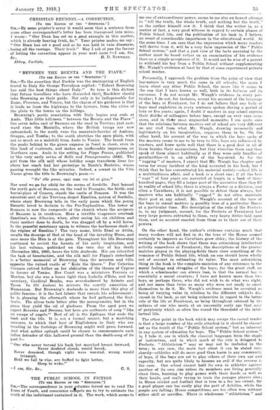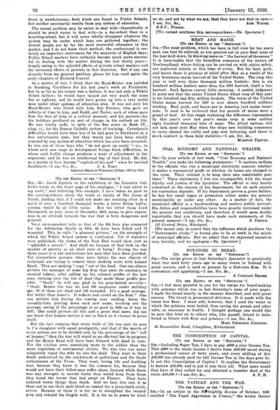TUE PUBLIC SCHOOL IN FICTION [To VIE EDITOR or THE
" SPECTATOR."] Sta,—The correspondence in your solumns forced me to read The Loom of Youth, and conscience colapels me to try to estimate the truth of the indictment contained in it. The work, which seems to
me one of extraordinary power, seems to me also an honest attempt to "tell the truth, the whole truth, and nothing but the truth." as the author himself saw it. I think that the writer is, as a matter of fact, a very good witness in regard to certain phases of Public School life, and the publication of his book is, I believe, an event of considerable importanoe in the educational world. At the same time, I am sure that the impression which many readers will derive from it, will be a very false impression of the " Public School system," and that a just view of the facts narrated by the author must be based rather on an examination of his evidence than on a simple acceptance of it. It would not be wise of a parent to withhold his boy from a Public) School without supplementing Mr. Waugh's evidence at least by that of some experienced private school master.
Personally, I approach the problem from the point of view that boy-nature is very much the same in all schools; the mere .I learn about any other Public School, the more like it seems to the one that I have known so well, both in its failures and its successes. I do not accept Mr. Waugh's evidence in every par- ticular; I do not, for instance, accept his account of the language of the boys at Fernhurst, for I do not believe that any body of boys used expletives in every sentence spoken during a period of four or five years; again, I doubt if masters in any school express their dislike of colleagues before boys, except on very rare occa- sions, and in their most unguarded moments; I am quite sure that the relations between masters out of school are very different on any staff from what Mr. Waugh, drawing necessarily and legitimately on his imagination, supposes them to be. On the other hand, his account of the way in which the boys spoke of the masters seems to me to be true to life; boys are influenced by masters, and know quite well that there is a good deal in all of them besides their mannerisms, but they visualize them and they speak of them almost habitually as if they were only bundles of peculiarities—it is an oddity of the boy-mind. As for the " ragging " of masters, I expect that Mr. Waugh has chapter and verse for every incident of the kind narrated in his book, but I think that he has concentrated his material unduly—school life is a multitudinous affair, and a book is a short one; if all the best "rags " of four years are narrated at length in a book of three hundred pages, they fill a larger part of the narrative than they fill in reality of school life; there is always a Foster in a division, and often a Caruthers; it is not possible to defeat them always, but masters who are habitually " ragged " do not often maintain their post at any school. Mr. Waugh's account of the tone of the boys in sexual matters is possibly true of a particular House at a particular time. His description of the rule of the Prefects is, in my judgment, correct, for the Prefects at Fernhurst had very large powers entrusted to them, very heavy duties laid upon them, and no account exacted from them as to their use of their powers.
On the other hand, the author's evidence contains much that many readers will not find in it; the tone of the House seemed certainly to improve as Caruthers grew older; the history of the writing of the book shows that there was astonishing intellectual activity somewhere at Fernhurst; the descriptions of the greater matches played in the playing-fields there show something of the romance of Public School life, which no one should leave wholly out of account in estimating its value. The most astonishing thing in the book is the complete omission of any reference to the moral feelings and struggles of the boys; for the great staff, on which a schoolmaster can always lean, is that the normal boy is essentially a moral creature; I have not known more than two boys, or perhaps three, who did not wish to do what was right, and not more than twice as many who were not ready to exert themselves to do it. Mr. Waugh's evidence must be accepted as being of varying value in relation to the different subjects dis- cussed in the book, as not being exhaustive in regard to the better side of the life at Fernhurst, as being throughout coloured by the sadness of one who meets at an unusually early age that mist of perplexity which so often lies round the threshold of the intel- lectual life.
The other point in the book which may escape the casual reader is that a large number of the evils attacked in it should be classed not as the result of the " Public School system," but as inherent in any system of education for boys. The "Public School system " is, I take it, one in which the classical languages form the staple of instruction, and in which much of the rule is delegated to Prefects. "Athleticism " may or may not be included in the term; in any case, the main fact about it can be stated very shortly—athletics will do more good than harm in any community of boys, if the boys are set to play others of their own age and capacity, but are quite likely to become an evil if the reverse is the case. One school cannot hold its own in athletics against another of its own size unless its members are living generally clean lives, learning to play games with their heads as well as their hands, and really trying to train the younger players also; in House cricket and football that is true to a far less extent, for a good player can too easily play the. part of Achilles, while the people are falling; House competitions are too often won without either skill or sacrifice. There is wholesome " athleticism "- and there is unwholesome; both kinds are found in Public Schools, but neither necessarily results from any system of education.
The sexual problem may be easier to deal with—theoretically it should be much easier to deal with—in a day-school than in a boarding-school, but it will never wholly disappear whatever the system may be under which boys are gathered together; the Jewish people are by far the most successful educators in this matter, and I do not know their method; the confessional is cer- tainly an imperfect instrument for the majority of English boys; Public School masters have certainly become much more success- ful in dealing with the matter during the last thirty years— largely owing to the splendid efforts of private school masters and the increased efforts of parents in this direction. But if any one dissents from my general position, please let him read again the early chapters of Richard Feverel.
As a matter of fact, I think that the Head-Master was justified in thanking Caruthers for his last year's work at Fernhurst, but in so far as his career was a failure, it was not only a Public School failure; he would have turned out very much the same boy at eighteen, and he would have grown up into a very useful man under other systems of education also. It was not only his Head-Master who failed with him, but Ferrers, who gave an infinity of time to him, and Rudd, and Tester, each of whom gave him the best of help at a critical moment, and his parents—for the holidays produced no sort of change in his outlook on life. He was totally unfit, in spite of the fine scene in. Book IV., chap. vi., for the Roman Catholic system of training. Caruthers's difficulties would have been less if he had gone to Fernhurst at a less unfortunate time, but they would not have been wholly removed by any system of education which has ever been invented; he was one of those boys who " do not grow up easily "—i.e., to whom each new stage in development brings fresh difficulties, in whom each bodily change produces a want of adjustment in the organism; and he was an intellectual boy of that kind. He did, as a matter of fact, become "captain of his soul " when he reached Sandhurst.—I am, SiT, &c., J. A. FORT,
Assistant-Master at Winchester College, 1883 to 1913.



























 Previous page
Previous page